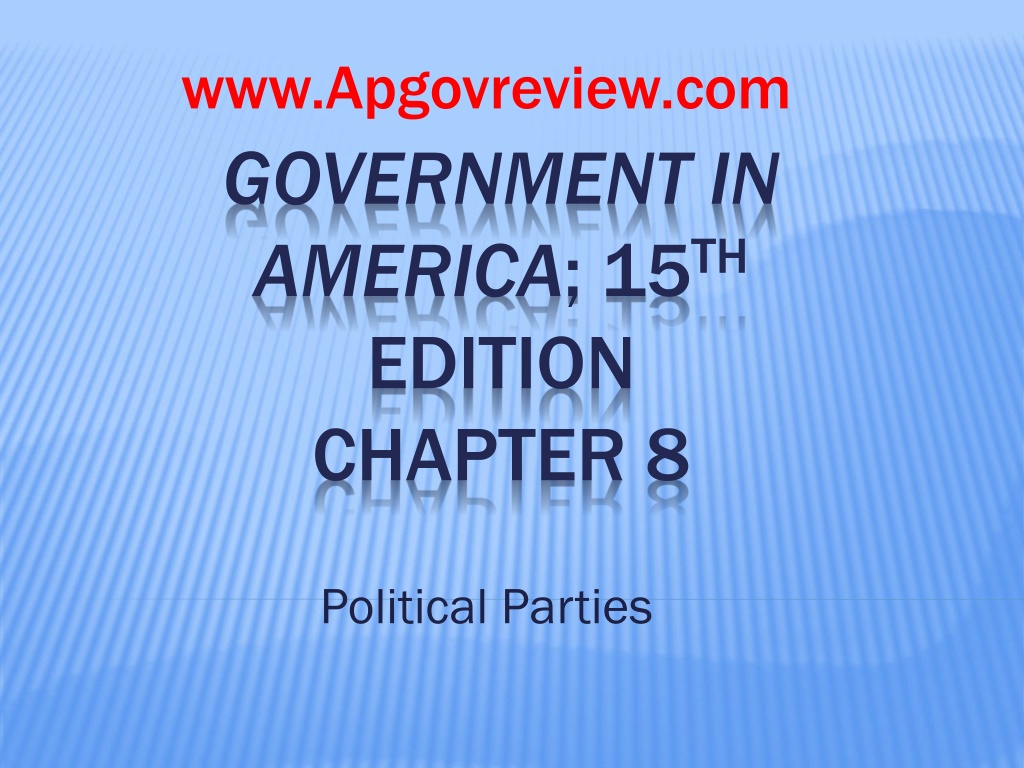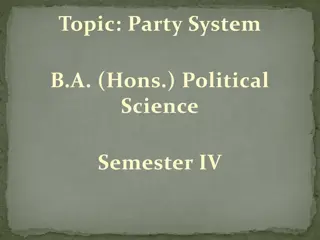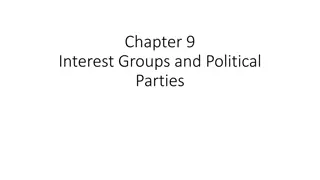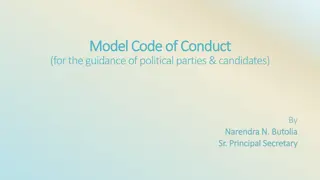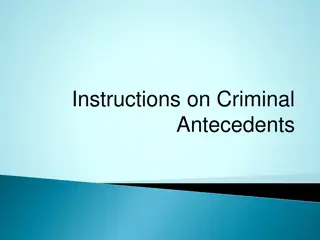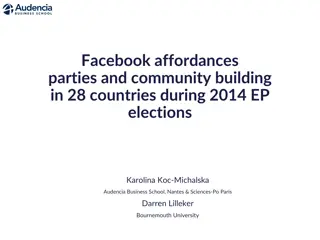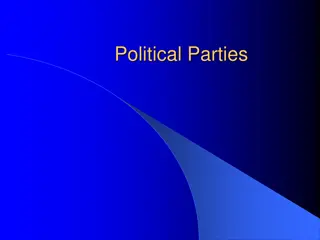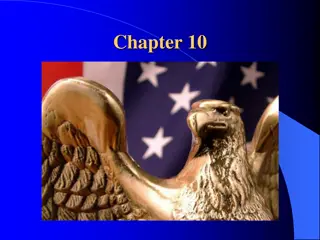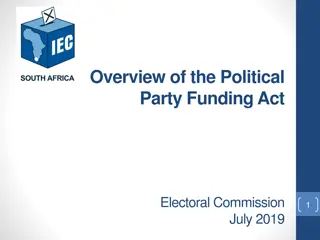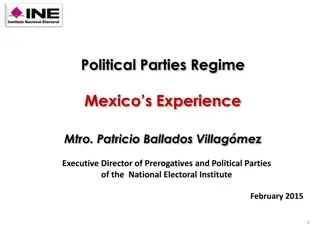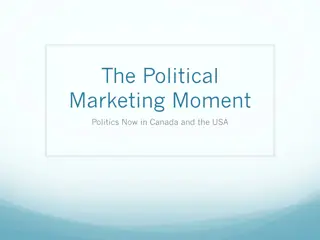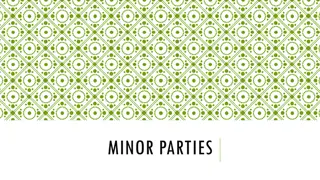Understanding Political Parties in America
Political parties in America play a crucial role in the electoral process, serving as linkage institutions between the public and government. They consist of party members in the electorate, organizational structures, and elected officials in government. The chapter delves into the meaning of political parties, their functions, and the party systems in the United States. It explores party identification, rational-choice theory, party organizations from local grassroots to national levels, and the significance of party platforms and conventions in shaping policies and election outcomes.
Download Presentation

Please find below an Image/Link to download the presentation.
The content on the website is provided AS IS for your information and personal use only. It may not be sold, licensed, or shared on other websites without obtaining consent from the author. Download presentation by click this link. If you encounter any issues during the download, it is possible that the publisher has removed the file from their server.
E N D
Presentation Transcript
www.Apgovreview.com GOVERNMENT IN AMERICA; 15TH EDITION CHAPTER 8 Political Parties
THE MEANING OF PARTY What is a political party? People trying to win office and control the government Party in the electorate: Any American can be a member of any party at any time membership cards or dues are not required Party as an organization: Parties have national and local offices and staffs Party in government: Those that are elected Tasks of the Parties: Linkage institutions way that people s concerns help become political issues Parties decide candidates presidential nominees are chosen by the public Run campaigns on all levels Provide info to the public Articulate policies via platforms Coordinate policymaking between the legislative and executive branches
THE MEANING OF PARTY CONT. Rational-Choice Theory: Voters want their policies to be adopted by the government, parties want to win elections Most Americans identify themselves as centrists or just to one side Parties with extreme ideas are rarely successful The Prohibition Party received only 519 votes in the 2012 Presidential Election.
THE PARTY IN THE ELECTORATE Party image: Idea that individuals have a certain image of each political party Party identification: Preference for a party Most voters vote for candidates of the party they identify with Ticket Splitting: Voters that vote for one party for an office and another party for another office Occurs most often with Independents
THE PARTY ORGANIZATIONS: FROM GRASS ROOTS TO WASHINGTON Local Parties Party Machines: Organization that would reward members in some way Rely on ethnic support Irish Tammany Hall Most often, patronage is used Patronage: Jobs given to political supporters Boss Tweed sold jobs for $ Merit system is often used today Parties In The States: States decide election procedures for parties Open primary: any voter can participate in the primary Closed primary: only registered party members can vote in primaries National Party Organizations: National Convention: Occurs every 4 years, writes the party s platform National Committee: Run the party between conventions Made up of representatives from the states National Chairperson: Hires staff and takes care of day-to-day business of the party
THE PARTY IN GOVERNMENT: PROMISES AND POLICY Coalition: Individuals that support the party based on the party s track record This can (and often does) change based on the fulfillment of promises (LBJ promising not to send Americans to Vietnam, Bush s Read my lips ) More often than not, presidential platforms meet many of the promises of the campaigns Clinton s gun control Bush s tax cuts
PARTY ERAS IN AMERICAN HISTORY Throughout American history, a two-party system has dominated Even though Washington warned of political parties in his Farewell Address 1796 1824: The First Party System: Federalists (Hamilton) vs. Democratic-Republicans (Jefferson) 1828 1856: The Democrats and Whigs During Jackson s presidency, the Democratic party was born Many voting requirements were eliminated for adult, white males Martin Van Buren was the architect of the party Whigs Henry Clay! formed in opposition to Jackson 1860 1928: The Two Republican Eras: Republican Party formed in the 1850s opposed the expansion of slavery Favored high tariffs, internal improvements, and gold standard
PARTY ERAS IN AMERICAN HISTORY 1932 1964: The New Deal Coalition: The Great Depression and New Deal shifted party loyalties Democrats favored increased government involvement New Deal Coalition: Those that began to vote Democratic included: Those living in cities, unions, poor individuals, blacks, etc. The Great Society continued ideas of the New Deal and added civil rights legislation 1968 Present: Southern Realignment ..: Since Nixon s 1968 election, most often a single party does NOT control the White House and both houses of Congress Political dealignment: Idea that many people are moving away from the two political parties
THIRD PARTIES: THEIR IMPACT ON AMERICAN POLITICS Third Parties: 3 Main Types: Promote a certain cause (pro-life, prohibition, etc.) Splinter parties split from a major party (Bull Moose Party) Based on an individual hoping to be president (Ross Perot in the 1990s) Often, the two parties do not take a stand on controversial issues Fear of losing many voters 1. 2. 3.
UNDERSTANDING POLITICAL PARTIES Responsible Party Model: Idea that a majority party would implement its programs All members of the party would be united with the program The minority party would let the public know what it would do The majority party is responsible for the actions of the government Not all party members always agree on platforms Southern Democrats tend to be more fiscally conservative than their counterparts
QUICK RECAP Linkage Institutions Ticket Splitting Party Machines Patronage The New Deal Coalition Types of third parties
THANKS FOR WATCHING! Subscribe to my channel Help spread the word Questions? Comments? Leave in comments I hope you haven t forgotten about me ..
